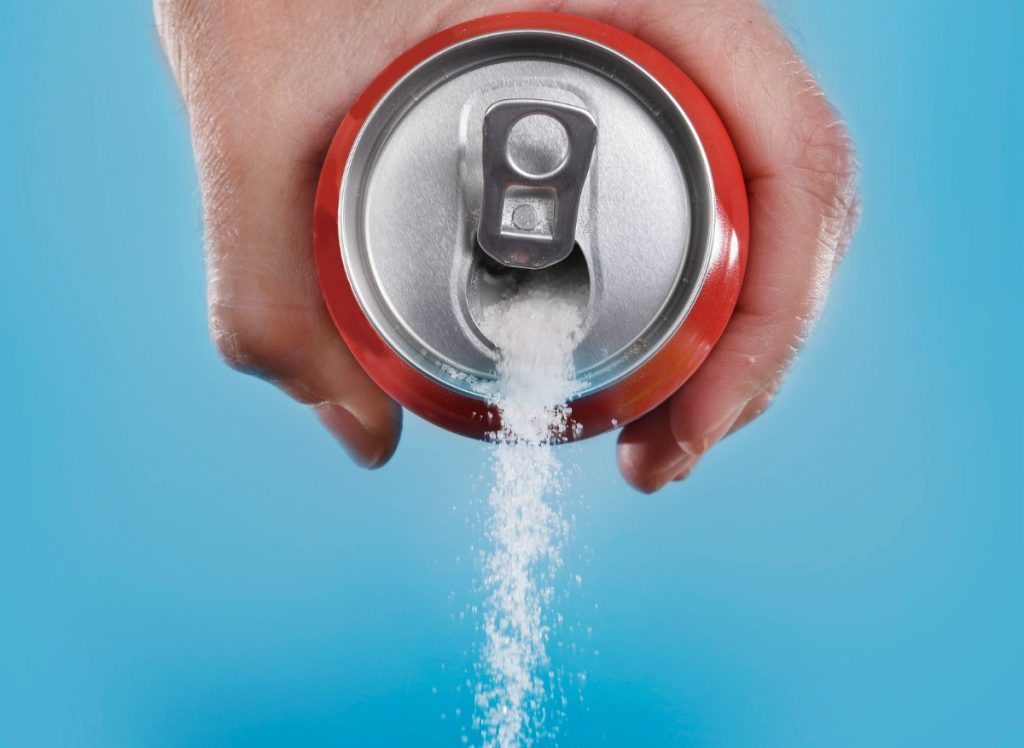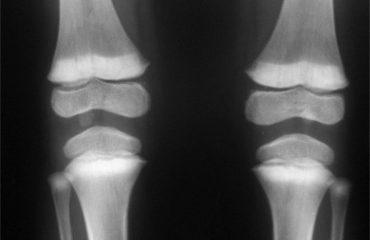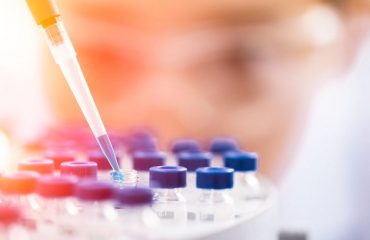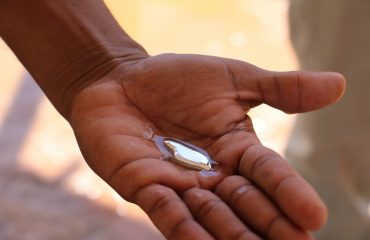In the United States, an adults daily caloric intake contains approximately 17% sugar and in children it is approximately 14% of their daily intake. https://www.ncbi.nlm.nih.gov/pmc/articles/PMC5251321/. In 2008, one study showed people in the U.S. were consuming over 60 pounds of added sugar a year and the average daily intake was 19 teaspoons or 306 additional calories a day and those results did not include fruit juices.
According to the American Heart Association (AHA), the maximum amount of added sugar you should eat each day is 150 calories, or 9 teaspoons for men, and 100 calories, or 6 teaspoons for women. The World Health Organization recommends no more than 6 teaspoons, or 25 grams, a day for any adult, regardless if you are a man or woman. https://www.who.int/nutrition/publications/guidelines/sugars_intake/en/
Drinks such as soda and sports drinks are the leading source of sugar in the United States with approximately 60% of kids and 50% of adults consuming at least one sugary drink a day. Research published in the British Medical Journal (BMJ) provides additional evidence that these beverages may increase the risk of cancer.
Study Design
This observational study of the French NutriNet-Sante cohort from 2009-2017, included more than 101,000 participants aged 18 or more and followed them for 9 years with a median follow-up period of 5.1 years. Researchers assessed the intake of sugary and artificially sweetened beverages using 24-hour dietary records. The study evaluated the association between sugary drink consumption and the overall risk of breast, prostate, and colorectal cancer.
Results
In their analysis, researchers controlled for obesity and weight gain and results showed sugary drinks were significantly associated with an increased rate of cancer. Direct cause cannot be achieved in an observational study, however, when compared to individuals that did not consume sugary beverages, results showed every 3.4-ounce serving was associated with and 18 percent increased risk overall cancer. The greatest difference was seen with breast cancer at a 22% increased risk of developing breast cancer.
Universal Cancer Bio-Marker Testing at The Anti-Aging and Wellness Clinic
About the IvyGene Core Test
The IvyGene Test (http://ivygenelabs.com), is a simple blood test that confirms the presence of cancer as early as stage 1 and provides measurable information about cancer.
The IvyGene technology analyzes methylation ratios at specific gene targets in cell-free DNA. By identifying which gene targets are consistently hyper-methylated when cancer is present
IvyGene technology is validated for:
- Breast Cancer
- Lung Cancer
- Liver Cancer
- Colon Cancer
However, the test may detect up to 20 other types of cancer. The IvyGene test has a sensitivity of 84% and specificity of 90%
IvyGene technology is a highly accurate way to confirm the presence of certain cancers
When to Get the IvyGene Core Test
The IvyGene Core test is appropriate for patients to:
- Confirm the presence of specific cancer
- As a supplemental test with other tests
- As a follow-up to other diagnostics and screening tests.
- Such as abnormal imaging or abnormal BRCA1 and BRCA2 test
- To monitor for recurrence
Note: The IvyGene test is not classified a screening test.
The IvyGene™ Test has been validated with four (4) cancer tissues of origin: breast, colon, liver and lung cancers. The presence of other cancer types may also result in an elevated IvyGene™ Score. A large-scale clinical trial to demonstrate the efficacy of the IvyGene™Test as a cancer screening test has not been conducted.
Recommendations for reducing your sugar intake
- Replace table sugar with honey or unsweetened apple sauce
- Drink water or tea instead of sugary drinks
- To add flavor to your water try adding lemons, limes, cucumbers or strawberries
- Eat fresh or frozen fruit instead of canned fruit
- Read the label of foods and choose the brand with the lowest amount of added sugar. Remember items like ketchup and barbecue sauce have added sugar.
- Use extracts like almond, vanilla, orange or lemon extract in recipes
- Replace sugar with spices like ginger, cinnamon or nutmeg
Remember sugar can have many names:
- agave syrup
- brown sugar
- cane juice and cane syrup
- confectioners’ sugar
- corn sweetener and corn syrup
- dextrose
- fructose
- fruit juice concentrates
- glucose
- granulated white sugar
- high-fructose corn syrup
- honey
- invert sugar
- lactose
- maltose
- malt syrup
- molasses
- raw sugar
- sucrose
- syrup.
Using innovation, the most advanced treatment options and cutting-edge science, our mission is to develop a customized health program that will enable you to achieve your peak physical and mental performance. We want to help educate and empower you to take charge of your health allowing you to live a longer, healthier, more active and productive life. Contact us today to learn more about cancer testing and other laboratory tests offered at the Anti-Aging and Wellness Clinic.
Scientific References
- A review of total & added sugar intakes and dietary sources in Europe. Azaïs-Braesco V1, Sluik D2, Maillot M3, Kok F2, Moreno LA4. Nutr J. 2017 Jan 21;16(1):6. doi: 10.1186/s12937-016-0225-2
- Sugary drink consumption and risk of cancer: results from NutriNet-Santé prospective cohortBMJ 2019; 366 doi: https://doi.org/10.1136/bmj.l2408 (Published 10 July 2019) BMJ 2019;366








